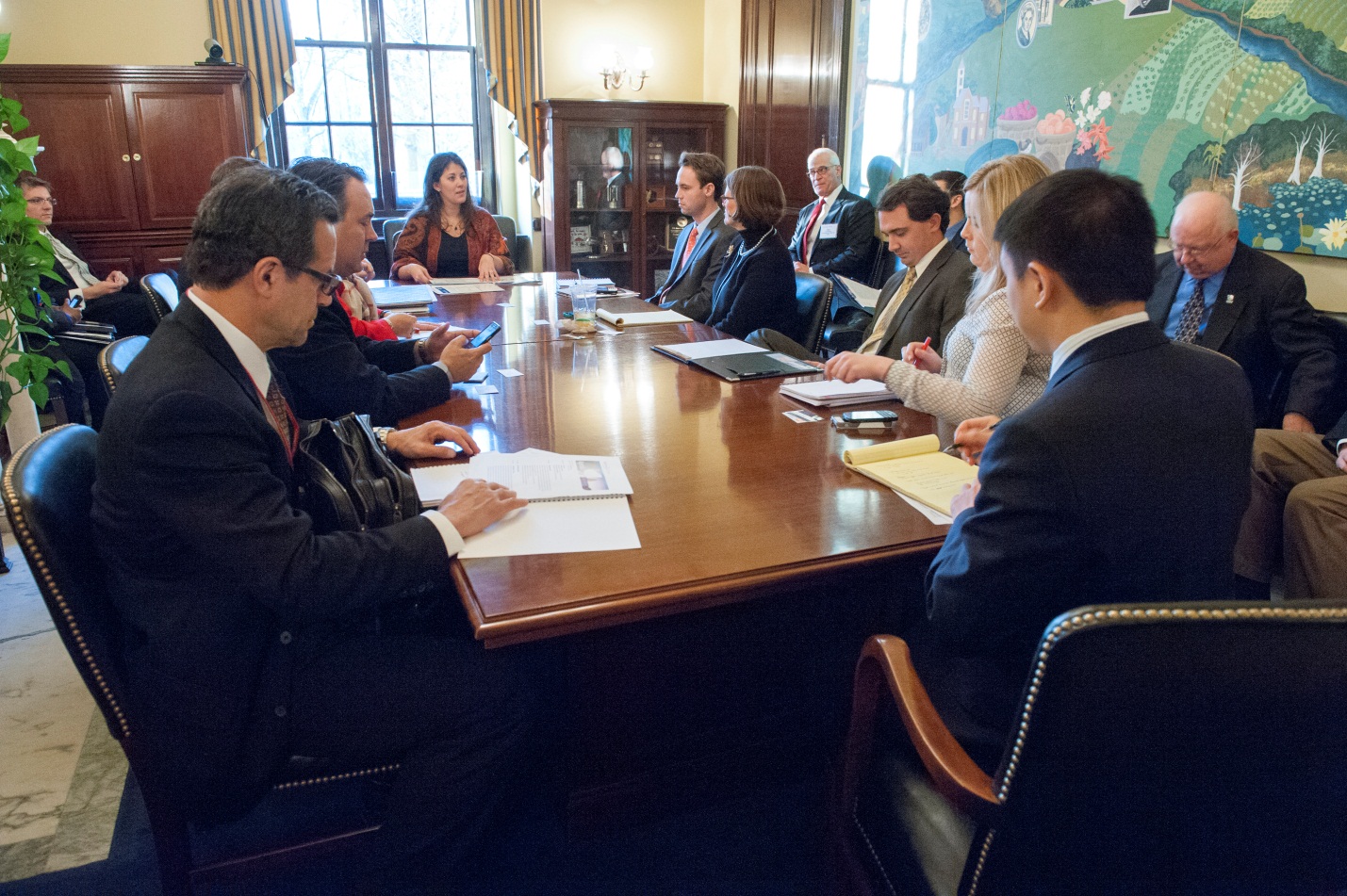 The 2015 TechAmerica D.C. Fly-In, organized by TechAmerica — the public sector and public advocacy department of CompTIA and the Technology Councils of North America (TECHNA) — brought more than 140 technology executives and business owners representing 29 states to Washington, D.C., on Feb. 10 and 11, kicking off with a lunch and a keynote presentation on the Internet Tax Freedom Act
The 2015 TechAmerica D.C. Fly-In, organized by TechAmerica — the public sector and public advocacy department of CompTIA and the Technology Councils of North America (TECHNA) — brought more than 140 technology executives and business owners representing 29 states to Washington, D.C., on Feb. 10 and 11, kicking off with a lunch and a keynote presentation on the Internet Tax Freedom Act
Since its enactment, ITFA has banned federal, state and local governments from taxing Internet access charges, as well as from assessing multiple or discriminatory taxes on electronic commerce. Sprinkle urged Fly-In attendees to call on Congress to act swiftly to permanently extend ITFA this year. The moratorium, which has been extended five times since its enactment in 1998, is now set to expire on Oct. 1, 2015. Now is the time, she said, to make this ban permanent to avoid future uncertainty for all.
The Future of Broadband
The Tech Policy Summit included a day of panels, each covering a trending topic in the IT space. Broadband was the first topic at hand during the Fly-In’s Tech Policy Summit.
Deb Socia, executive director for Next Century Cities, Staci Pies, senior policy counsel at Google, and Nick Maynard, assistant director of telecommunications innovation for the White House Office of Science and Technology Policy focused on what can be done on both the federal and state levels to encourage high-speed broadband competition.
Socia recommended city governments think of creative financial models and search for federal grant programs in order to get broadband capability, while Pies talked about local government providing access to publicly owned “rights of ways” including access to existing infrastructure, like getting to utility poles to string fiber.
“If cities can pass laws and regulations to make that easy,” Pies added. “Although simplistic, it would really help with broadband deployment.”
She also discussed dig once policies as important at the federal level, as well as making available accurate up-to-date data such where all the current utilities are located. Maynard discussed a private/public partnership called US Ignite that is accelerating the development and deployment of next-generation applications that capitalize on the potential for gigabit broadband networks ultimately improving education and workforce development.
Cybersecurity: The Reality
Later in the day, a panel on cybersecurity provided a holistic view of the cybersecurity landscape in 2015 and the reality of cybersecurity threats, what the federal government is doing to combat them, and how they impact the day-to-day operations of SMB companies. Panelist included Eric Cho, counsel for Acquisition Policy for U.S. House of Representatives, Tom Kellerman, chief cybersecurity officer for Trend Micro, and Tom Parker, chief technology officer at Fusion X.
“Cybersecurity is not a new issue, however, the landscape of cyber threats has radically changed,” said Parker. “Now, we’re dealing with professional criminals and radical groups who are leveraging cyber as a way to extort businesses. In fact, these new attacks are changing our perception of cyber threats.”
Kellerman stressed that website security should be paramount and that a business’ cloud strategy should be intertwined with a mobile strategy. “Although it’s difficult to quantify what your threat is going to be, it’s important to take measures to protect a business,” he stressed.
Cho discussed the importance of working with other nations on cybersecurity as more standards get developed and put into place. He talked about the importance of Congress not legislating in distress but working to get laws now into place now including a national approach to data breach notification.
High-Skilled Immigration Reform
During the third panel of the day, a roundtable of experts looked at what it would take to pass high-skilled immigration reform legislation in a Republican-led Congress. Panelists included Scott Corley, executive director of Compete Coalition, Tom Jawetz, democratic chief counsel for the Subcommittee on Immigration and Border Security of the House Committee on the Judiciary, and Matt Sandgren, senior counsel to Sen. Orrin G. Hatch of the Senate Judiciary Committee.
Panelists discussed the Immigration Innovation Act, also known as I-Squared, which TechAmerica supports and urges Congress to enact. It was reintroduced with bipartisan support and addresses high-skilled immigration and domestic pipeline workforce challenges. Among other things, the bill increases the H-1B cap and establishes a market escalator so that the cap can be adjusted up or down in response to the demands of the economy. On that bill, Jawetz said, I-Squared may likely get broken apart and pieces of it may be worked on.
The panelists also talked about the impact of President Obama’s series of executive actions issued late last year that would modify our immigration system. Included in this series was a directive that would require DHS to take a number of administrative actions designed to streamline the high-skilled immigration system. In retrospect, panelists agreed that while comprehensive immigration reform started out as a process, it has become political resulting in very little movement. In fact, Corley stressed high-skilled immigration reform will never pass on its own.
Corley also added that opponents of these bills say that high-skilled immigration reform takes away jobs, but that’s not the case, he said: “It creates jobs — and if we don’t support and hire the best and the brightest, other countries will.”
Lana Sansur covers advocacy and public relations for TechAmerica, the public sector and public policy division of CompTIA.

